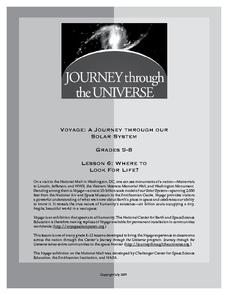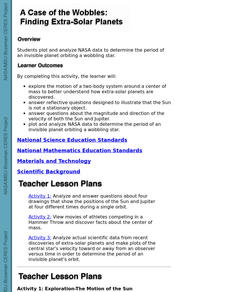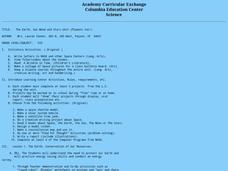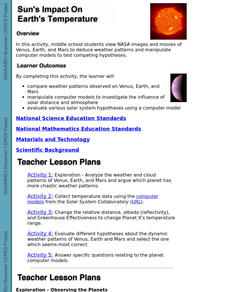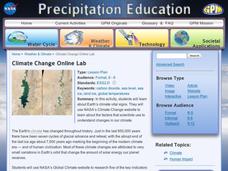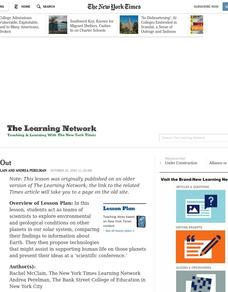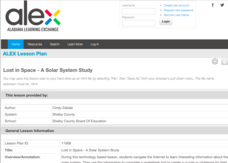NASA
Dark Matter NASA Conference
Young scholars calculate the escape velocity of planets in our solar system and use that knowledge to calculate the escape velocity for NGC 2300 group. They then suggest reasons for the escape velocity to be higher than possible given...
Curated OER
NASA Plans Moon Base
Students react to statements about the moon, then read a news article about NASA's plans to build a permanent base on the moon. In this space science and current events lesson, the teacher introduces the article with a discussion and a...
Journey Through the Universe
Where to Look For Life?
Every year we discover new planets including more than 1,000 in 2016 alone. Will we ever find life on another planet? The lesson includes two activities to help scholars understand this concept. First, they analyze the temperature range...
Curated OER
Puzzling Planets
Students examine the concept of a solar system. In this research based lesson, students compare a star and a planet. They explain the requirements for life in a biosphere.
Curated OER
Planet-Tac-Toe Review Game
Students research the nine planets in the solar system. They play a board gram like tic-tac-toe using the names of the planets. Factual info is given to help play the game.. This sounds like a fun review game.
Curated OER
Discovering Saturn, The Real "Lord of the Rings"
Reading, writing, and rings! A lesson from NASA combines space science with authentic reading and writing tasks. Included in this lesson are pre-reading activities, four mini informational booklets on Saturn, a structured note-taking...
Curated OER
Finding Extra-Solar Planets
High schoolers plot and analyze NASA data to determine the period of an invisible planet orbiting a wobbling star. They explore the motion of a two-body system around a center of mass to better explain how extra-solar planets are...
NASA
Let's Investigate Mars
Take your science class on a hypothetical field trip to Mars with an engaging astronomy lesson. After first learning about NASA's Mars rover missions, young scientists plan their own scientific investigations of Earth's nearest neighbor.
Curated OER
Life Beyond Earth
Students investigate the solar system and what makes a planet habitable. They complete an online Webquest, simulate a NASA training program online, take an online quiz, answer discussion questions, and locate newspaper articles about the...
NASA
Geographical Influences
"If global warming is real, why is it so cold?" Distinguishing the difference between weather and climate is important when it comes to understanding our planet. In these activities, young scientists look at the climate patterns in a...
Curated OER
The Drake Equation
Students use the Drake Equation to calculate the probability of sustaining life on various planets. Through the use of the equation, they determine whether intelligent and advanced civilizations can be developed on planets other than...
Curated OER
Etymology
Students tie together planet names with Greek mythology. Students browse thru a dictionary to see where exactly these names came from and what significance they have. Students explore the origins of some English words.
Chicago Botanic Garden
Personal Choices and the Planet
The last activity in the series of four has individuals determine steps they can take to reduce their carbon footprints and then analyze their schools' recycling programs. Through a sustainability audit, they identify how and where their...
Chicago Botanic Garden
Personal Choices and the Planet
How big is your footprint? Activity three culminates the series by having groups complete carbon footprint audits with people in their schools and/or around the districts. Groups then gather their data, create a presentation including...
Curated OER
The Earth, Sun, Moon, And Stars
Fifth graders explore the solar system. In this solar system unit, 5th graders investigate numerous projects while rotating through learning centers. Students write about space and construct a space shuttle model. Students practice map...
Curated OER
History of Saturn Discoveries
Students interpret how scientists have explored Saturn. In this NASA based astronomy lesson plan, students create a timeline depicting the study of Saturn from 1610 until 2010. Each student will write a letter to Galileo discussing how...
Curated OER
Space: Stars and Planets
Students observe and report that the moon can be seen sometimes at night and sometimes during the day. They describe how changes to a model can help predict how the real thing can be altered. Students explain the essential fact of the...
Curated OER
Solar System Search
Learners learn the names of the nine planets. They are then given a worksheet which they use to identify the planets based on actively listening to the teacher's oral description. This is a great listening activity.
NASA
Biology Training Conclusion
Gravity is just one consideration when determining human habitability on a new planet. The lesson connects four different units and starts with connecting the various systems: planetary systems, human body systems, etc. After scholars...
Curated OER
Sun's Impact On Earth's Temperature
Students view NASA images and movies of Venus, Earth, and Mars to deduce weather patterns and manipulate computer models to test competing hypotheses. They manipulate computer models to investigate the influence of solar distance and...
NASA
Climate Change Online Lab
What are the key indicators that show scientists that our planet is in the fastest warming trend ever? Learners go on a WebQuest to examine the evidence for themselves. Following several links to NASA sites, kids see how the global...
Curated OER
Spacing Out
Students explore environmental and geological conditions on other planets in our solar system, comparing their findings to information about Earth. They propose technologies that might assist in supporting human life on those planets.
National Wildlife Federation
Wherefore Art Thou, Albedo?
In the sixth lesson in a series of 21, scholars use NASA data to graph and interpret albedo seasonally and over the course of multiple years. This allows learners to compare albedo trends to changes in sea ice with connections to the...
Alabama Learning Exchange (ALEX)
Lost in Space - A Solar System Study
Fourth graders study the planets of our Solar System collecting data on a worksheet. They use online tools to create a puzzle or other digital product using the information from their research.




